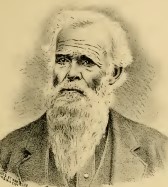 ALBERT JAMES BARRETT -----Was born in
Fairfield, Somerset County, Maine, on the twenty-eighth
day of February 1822. His ancestors were among the early
settlers of America, his great-grandfather and six sons
coming from England and first settling in Massachusetts
prior to the Revolutionary War, five of whom served in
the struggle for independence against the mother
country. ALBERT JAMES BARRETT -----Was born in
Fairfield, Somerset County, Maine, on the twenty-eighth
day of February 1822. His ancestors were among the early
settlers of America, his great-grandfather and six sons
coming from England and first settling in Massachusetts
prior to the Revolutionary War, five of whom served in
the struggle for independence against the mother
country.
His
father Mr. C. Barrett, was born in New Hampshire, and
his mother, Betsy Barrett nee Davis, was a native of
Maine. On the father's side the English is allied with
Scotch, his grandmother being a descendant of the
Chalmers of Scotland a family respected and esteemed on
either side of the Atlantic.
Barrett, Sen., father of the
subject of this sketch, followed the cooper's trade, and
the son was, at the early ago of five years, inducted
into the mysteries of sawing staves, and at seven years
was promoted to the "bench," shaving hoops. He continued
to follow this trade until 1850, when, animated by a
desire to improve his fortunes, he embarked on the
steamer Crescent City for California. Crossing the
Isthmus and finding no 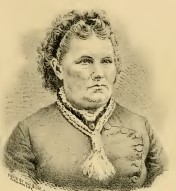 steamer
ready to sail, he engaged in working at his trade for
two months, and then taking passage on the Northerner,
landed in San Francisco on the sixth of July, 1851, and
from thence to the mines. Not finding the success he
anticipated, he left the mines and settled in
Sacramento, working at his trade for three years. From
thence he removed to Michigan Bar, and for one and a
half years followed merchandising. Subsequently he
engaged in the same business in other places, closing at
Brownsville.
steamer
ready to sail, he engaged in working at his trade for
two months, and then taking passage on the Northerner,
landed in San Francisco on the sixth of July, 1851, and
from thence to the mines. Not finding the success he
anticipated, he left the mines and settled in
Sacramento, working at his trade for three years. From
thence he removed to Michigan Bar, and for one and a
half years followed merchandising. Subsequently he
engaged in the same business in other places, closing at
Brownsville.
In 1857
he purchased a ranch in Yolo County, on which he resided
for three years, and then disposing of that removed to
San Francisco. Dissatisfied with city life, in company
with Capt. A. W. Pray, he removed to Nevada and erected
the first sawmill at Glenbrook, near Lake Tahoe, in
which business they continued for one year, and then
selling his interest in the mill removed from Glenbrook
and located on Clear Creek, in Ormsby County, Nevada,
farming for two years at that place, and subsequently
for thirteen years near Dayton. Renting his ranch in
Dayton, he removed to Mason Valley, Esmeralda County,
where he still resides.
Mr.
Barrett was married March 22, 1848, to Miss Olin E. Day,
daughter of Tobias and Phoebe Day, of the State of
Massachusetts. They are blessed with five children, all
living-George A., Mary W., Charles H., Isabel F., and
Lettie C. The eldest daughter, the wife of Charles W.
Mallett, resides near her parents in Mason Valley. They
have one son, William Albert, born July 28, 1879. Mr. Barrett cast
his first vote for Henry Clay, the great Whig leader and
orator, in 1844, and like most of the New England men of
that political school, early united with the Republican
party, to which he has ever since belonged. In religion
he is best described as a Protestant in its most
acceptable sense, than which he could hardly be
otherwise educated, as he was in the common schools of
New England.
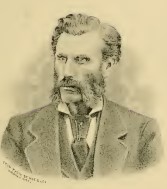 J. S.
CRAIG ----Is a native of Ireland, County of Donegal, and
was born in October, 1839. Leaving his native home at
the early age of twenty-two years became to America and
settled in Philadelphia, Pennsylvania, and there learned
the saddler's trade, at which he worked till 1860, in
which year he took passage for the State of California,
by way of the Isthmus of Panama, and from thence to
Nevada the following spring, engaging in the saddler's
business in Aurora, Esmeralda County, for a period of
eight years. From thence he removed to Pine Grove, in
1869, and resided there until 1875, whence he removed to
Greenfield, Esmeralda County, where he now resides. J. S.
CRAIG ----Is a native of Ireland, County of Donegal, and
was born in October, 1839. Leaving his native home at
the early age of twenty-two years became to America and
settled in Philadelphia, Pennsylvania, and there learned
the saddler's trade, at which he worked till 1860, in
which year he took passage for the State of California,
by way of the Isthmus of Panama, and from thence to
Nevada the following spring, engaging in the saddler's
business in Aurora, Esmeralda County, for a period of
eight years. From thence he removed to Pine Grove, in
1869, and resided there until 1875, whence he removed to
Greenfield, Esmeralda County, where he now resides.
Mr. Craig has,
during his leisure hours, devoted himself to the study
of the law, with such success that he was admitted to
the Bar in 1868, and with his professional avocation
combines the pursuits of the merchant and hotel keeper,
besides having charge of the express and post-offices,
kept in the store adjoining his hotel. To offset the
seeming blessings before mentioned, Mr. Craig might
count among his misfortunes that of having been Justice
of the Peace during most of the years of his residence
in the Silver State, an office that during the early
years of the settlement of the State necessarily
combined the Legislative, Judicial and Executive in
one.
One of
many instances illustrative of this occurred at
Rockland, Nevada, in 1872. During one of those early
entertainments known as "sprees," a desperado, known by
the name of Australian Kelly, engaging in a free fight
such as often were indulged in in those days, was
stabbed, and at the time supposed to be fatally, by one
Griffith. A man by the name of John Grosser was arrested
for the crime, though at the time of the affray he was
asleep in bed. Kelly believed, as did his friends, that
Grosser was the guilty party, and that Kelly was
mortally wounded. They determined to be avenged. To
accomplish this, three of Kelly's friends entered the
building where Grosser was held in custody by a
Constable, while the fourth, a large, powerful fellow,
remained outside. At the time agreed upon, he entered
the room, and, accosting Grosser, asked if he was the
man who cut Kelly. Grosser at once answered he was not.
The other, drawing a revolver, replied, " You are, and
you shall die;" but before he could use it Justice
Craig, who was present, with great courage and presence
of mind, seized the would-be murderer and thrust him
outside the building, closing the door. Immediately the
three others rushed for Grosser, when they were met by
the determined presence of the Constable, supported by a
cocked revolver, ready at a moment's notice to second
and support the action of the "Court." They soon decided
that Grosser was not the man they were looking after,
and the little meeting adjourned without notice. On the
examination Grosser was clearly proven innocent, and was
released-his life saved by the courage and prompt action
of the officers of the law.
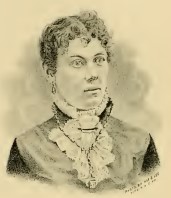 Justice
Craig was married in August, 1873, to Miss Kittie A.
McGower, a native of New York City, at the home of her
parents in Bridgeport, Mono County, California. They
have two little daughters living, and have buried one
son, who died in early childhood. Justice
Craig was married in August, 1873, to Miss Kittie A.
McGower, a native of New York City, at the home of her
parents in Bridgeport, Mono County, California. They
have two little daughters living, and have buried one
son, who died in early childhood.
 JASPER DANIEL ----Is a
native of the State of Indiana, born in Warren County,
March 13, 1843, where he remained until he reached the
age of thirteen years. His facilities for obtaining; an
education were only those of a common school, but he was
one to improve his opportunities, however measure they
might be, and succeeded in acquiring a fair knowledge of
the common branches. In 1856, Mr.
Daniel removed to the State of Iowa, and was a resident
of that State until 1862, at which time he emigrated to
the far West. He endured the hardships of a journey
across the plains and wintered with the "Saints" at Salt
Lake City, Utah. The next year he continued his travels
toward the setting sun, and as he expresses it: "Willed
away eight years of the choice portion of his life."
Being a man who observes, he learned a great deal
concerning the country and the peculiarities of the
people of the State of California and Territory of
Nevada, where he lived during the eight years before
mentioned. JASPER DANIEL ----Is a
native of the State of Indiana, born in Warren County,
March 13, 1843, where he remained until he reached the
age of thirteen years. His facilities for obtaining; an
education were only those of a common school, but he was
one to improve his opportunities, however measure they
might be, and succeeded in acquiring a fair knowledge of
the common branches. In 1856, Mr.
Daniel removed to the State of Iowa, and was a resident
of that State until 1862, at which time he emigrated to
the far West. He endured the hardships of a journey
across the plains and wintered with the "Saints" at Salt
Lake City, Utah. The next year he continued his travels
toward the setting sun, and as he expresses it: "Willed
away eight years of the choice portion of his life."
Being a man who observes, he learned a great deal
concerning the country and the peculiarities of the
people of the State of California and Territory of
Nevada, where he lived during the eight years before
mentioned.
He
finally returned to Iowa, and was married to the lady
who resides over his household at the present time. In
1876, Mr. Daniel returned once more to the Pacific
Coast, and has since been a resident of Greenfield,
Esmeralda County, Nevada, where he is engaged in
blacksmithing, also deals largely in agricultural
implements and general merchandise.
Mrs.
Josie Daniels, wife of the subject of the foregoing
sketch, is a native of the State of Iowa, born in
Audubon County, July 5, 1856, where she remained during
the first year of her life. In 1857, she went with her
parents to Missouri, and for the succeeding fourteen
years lived in that State, and then returned to Iowa,
and was soon after married. Her union with the husband of her heart, has been
blessed with two children, as follows: Ida E., aged
seven years and Ernest B., aged two years, Mr. and Mrs.
Daniel are much respected by their neighbors, and are a
well-to-do couple, living in the knowledge that they
have by industry and energy succeeded in establishing a
home surrounded with the comforts of life.
ALBERT
H. ERWAY ----Son of Charles and Susannah (Croddit)
Erway, was born near Ithaca, Tompkins County, New York,
January 8, 1811. His parents were also natives of New
York State.
The
first fifteen years of his life were divided between
working on a farm and attending school, and at that age
engaged as a driver on the "raging canal " in summer,
and was in the lumber business during the winter. In
1835 he removed with his parents to the State of
Michigan, locating at Three Rivers, St. Joseph County,
and entered a store as clerk, and soon after purchased
the business, and conducted the same for about three
years. The succeeding thirteen years he devoted to the
occupation of farming. In February, 1852, he, with his
family, sailed from New York on the steamship El Dorado,
crossed the Isthmus of Panama, and took passage on the
steamer Oregon for San Francisco, California, where he
landed April 7th.
His
first occupation in that State was mining on Mormon
Island. The next winter he went to Sacramento and in
company with a friend, purchased a stock of goods, which
they took to a place called Fiddletown. In this
enterprise they were successful, and continued the
business until after the destruction of Sacramento City
by fire. He then commenced freighting with a six-mule
team, making Stockton, San Joaquin County, his
headquarters.
In 1855 he returned with his family to the East,
and located in Cass County, Michigan, where he engaged
in the lumber business. One year later he suffered
losses by fire, and went to farming, which he followed
until 1860, when he went to Mills County, Iowa; thence
to Nebraska, and kept a hotel at Plattsmouth, Cass
County, until 1862, when he went to Denver, Colorado,
and, contracting the Salmon River mining fever, started
for the northwest.
He
spent one winter packing supplies from Walla Walla,
Washington Territory, to the mines in Idaho. In 1863 he
again sought California, and engaged in freighting from
Sacramento over the mountains. In 1866 he purchased a
ranch sixteen miles below the latter city. In 1868 he
came to Nevada, and engaged in the wood business at
Carson City, Ormsby County, also was interested largely
in freighting, but reverses overtook him, and he was
left to again build up a business, his entire capital
consisting of a ten cent piece, which was attached to
his watch chain.
At the
end of eighteen months he had by strict attention
established himself in business, and had teams worth
fully $3, 000.
In 1876 he settled in Mason Valley, Esmeralda
County, fully satisfied, after traveling over the State,
that this valley is inferior to none, as an agricultural
district, in the State.
Mr.
Erway was married February 11, 1838, to Miss Abigail
Jane Phillipps, a native of Kentucky. Their union was
blessed by eight children, all living at this time, six
of whom are being educated in the Eastern States. Mrs.
Erway died February 18, 1869.
In politics, Mr. Erway is a
Democrat of the old school. In business, he has always
been successful until he reached a certain point, when
reverses would surely overtake him, but now with his
fine ranch as a backer, he need fear no foe. He is able
to produce 2,000 bushels of grain per year from his
place, and thoroughly understands his business.
J. J.
FOX -----The subject of the following sketch is a native
of Germany, born in the town of Auggen, Muellheim. In the year
1854, he left his " Fatherland,"' bidding adieu to the
scenes of his youth, and came to the United States of
America.
His
first location after reaching American soil was in the
State of Missouri, where he lived nearly five years, and
in 1859 emigrated, having California as his objective
point. He came by way of the plains, and underwent all
the trials peculiar to a trip across the country. He
finally reached the Pacific Coast, and for a period of
about five years was a resident of the "Golden State."
In 1864 he crossed the mountains and became a resident
of Nevada, and in the winter of 1865-66, located in
Mason Valley, Esmeralda County, where he now lives. Mr.
Fox has a fine ranch in this beautiful valley, and is
one of the much-esteemed citizens of that locality; a
man of sterling worth, honest and upright in his
transactions with his neighbors, and will in time become
one of the solid men of the State.
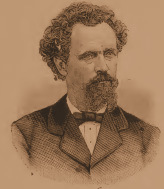 J. B. GALLAGHER ----Was
born in County Mayo, Ireland, in 1843, and came with his
parents to America when but a child. Arriving in this
country, his people went to the State of Wisconsin,
where they have since resided. J. B. GALLAGHER ----Was
born in County Mayo, Ireland, in 1843, and came with his
parents to America when but a child. Arriving in this
country, his people went to the State of Wisconsin,
where they have since resided.
The
subject of this sketch began the battle of life for
himself at an early age, and by industry and economy
saved money enough to pay his way at school, and
graduated from Bull's College, at Racine, Wisconsin.
Possessed of an ambitious nature, and realizing the fact
that wealth and intellectual improvement are the result
of personal effort and industry, he seized upon the
first opportunity to reach the much talked-about land of
gold in California, and engaged himself to a man to
assist in driving a band of sheep across the plains.
Upon
his arrival in California he did not realize the
fruition of his fondest hopes, and with youth and health
as his stock in trade, he turned his attention to the
"briny deep," and shipped before the mast on a vessel
then at San Francisco, engaged in the lumber and South
American trade, and in this ship visited all the ports
from Puget Sound to Valparaiso.
During
that time he saved some money, and entered the stock
business, which resulted decidedly to his advantage, and
for some years he was engaged in traveling in the
interests of his business, and became well known in
every town in California and all the northwestern
Territories, often going as far east as Fort Benton, on
the Missouri River. It is a safe assertion to say, that
Mr. Gallagher is one of the best informed men, in regard
to the geographical lay of the country, and the
peculiarities of its inhabitants, to be found west of
the Rocky Mountains.
Having
acquired a substantial capital, also a good reputation
as a stockman, he settled in Mason Valley, Esmeralda
County, Nevada, and purchased a largo tract of land. In
1873 he was elected to the Assembly of the State
Legislature; and in 1878 was elected to the high and
honorable position of Senator, an office he has
sustained to the satisfaction of his constituents. Mr.
Gallagher is an example of what can be accomplished with
industry, economy, perseverance, and a well-balanced
head. His
position in life, single. The information on Trails to
the Past © Copyright
may be used in personal family history research, with
source citation. The pages in entirety may not be
duplicated for publication in any fashion without the
permission of the owner. Commercial use of any material
on this site is not permitted. Please respect the
wishes of those who have contributed their time and
efforts to make this free site possible.~Thank
you! | | | |